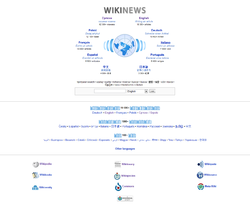 | |
 Screenshot of wikinews.org home page | |
Type of site | News wiki |
|---|---|
| Available in | Multilingual |
| Headquarters | Miami, Florida |
| Owner | Wikimedia Foundation |
| Created by | Wikimedia Community |
| URL | wikinews.org |
| Commercial | No |
| Registration | Optional |
| Launched | 8 November 2004 |
Wikinews is a free-content news source wiki and a project of the Wikimedia Foundation. The site works through collaborative journalism. Wikipedia co-founder Jimmy Wales has distinguished Wikinews from Wikipedia by saying "on Wikinews, each story is to be written as a news story as opposed to an encyclopedia article."[2] The neutral point of view policy espoused in Wikinews distinguishes it from other citizen journalism efforts such as Indymedia and OhmyNews.[3] In contrast to most projects of the Wikimedia Foundation, Wikinews allows original work under the form of original reporting and interviews.[4] The English Wikinews is the only Wikimedia site that grants press passes to reporters endorsed by the local community.[5] According to Thelwall et al., Wikinews has been most successful in covering large news events involving large numbers of people, such as Hurricane Katrina and the Virginia Tech Shootings, where first-hand experience, or the availability of first hand accounts, forms a larger part of the entry, and where the wealth of reportage makes a central "clearing house" valuable.[6]
- ^ "Wikinews.org Site Info". Alexa Internet. Retrieved 2012-08-02.
- ^ Joanna Glasner (29 November 2004). "Wikipedia Creators Move Into News". WIRED. Retrieved 2007-04-21.
- ^ Aaron Weiss (10 February 2005). "The Unassociated Press". The New York Times. Retrieved 2007-04-21.
- ^ Wikinews:Original reporting.
- ^ Wikinews:Credential verification
- ^ Thelwall, Mike & Stuart, David (2007), RUOK? Blogging Communication Technologies During Crises, Journal of Computer-Mediated Communication, pp. 523–548